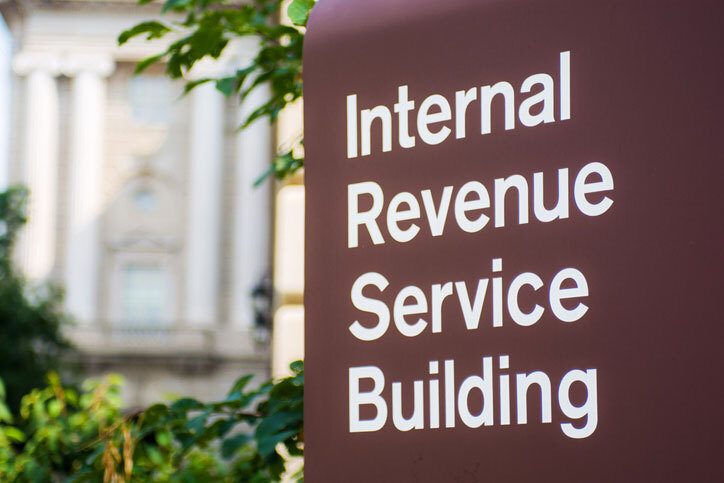Tax News
From the latest IRS updates to relevant news stories – your guide to tax relief.

In a similar fashion to last year, the IRS has announced that they will be extending the 2021 income tax filing and payment deadline.
The Debate Before the Decision
The House of Representatives pressured the IRS to consider moving the deadline stating that taxpayers still face the same challenges as the year prior.
However, many tax experts thought it unlikely that the deadline would get extended. At the start of the year, several reports claimed the IRS had no intention to change the deadline at all.
Nevertheless, the new filing and payment deadline was moved officially from April 15th to May 17th, 2021.
What Does the Extension Mean for You?
Since the IRS has returned to normal operations, they have actively targeted taxpayers with back taxes or unfiled tax returns to compensate for lost collection time.
Although you now have an extension, do not become complacent. Last year, millions of Americans made the mistake of waiting until the last minute, only for them to miss the deadline.
You must file as soon as possible if you have not yet done so already.
How Can TaxRise Help?
If you missed last year’s filing deadline or have multiple unfiled tax years, you can contact TaxRise to make you compliant. Our tax experts can:
- Prepare your tax returns.
- Protect you from IRS collections and penalties.
- Resolve your tax issues – such as liens, levies, wage garnishments – that were a result of multiple unfiled tax years.
Posted March 25, 2021 | Sean Lawless

The newly enacted American Rescue Plan provides Americans with a valuable tax exemption on top of stimulus checks and weekly unemployment compensation.
Some Taxpayers Can Exclude up to $10,200 in Unemployment Compensation
If your modified adjusted gross income (AGI) is less than $150,000, you don’t have to pay tax on up to $10,200 worth in unemployment compensation received from 2020.
In the case of married couples filing jointly, $20,400 of unemployment compensation is nontaxable, but only $10,200 per spouse.
For married couples filing separately, each spouse receiving unemployment doesn’t have to pay tax on $10,200 of that unemployment. However, amounts over $10,200 for each individual are still taxable.
Which States Waived States Income Tax on Employment?
These states have waived State income tax on unemployment:
- California
- Montana
- New Jersey
- Pennsylvania
- Virginia
And these states passed legislation that waives unemployment benefits for 2020:
- Maryland
- Delaware
If You Haven’t Filed Yet
The best way to protect yourself from IRS collections and penalties is to file your 2020 tax returns on time and as soon as possible.
That said, check with your tax preparer before you file and clarify if their tax program already includes the unemployment waiver.
Also, get your filing documents ready, determine how much you received on the first and second stimulus check, and find your unemployment filing forms 1099-G. If you did not get your 1009-G filing form, request a copy of it.
If you cannot file your taxes or do not have access to a tax preparer, TaxRise can file your taxes for you.
If You Have Already Filed
Be sure to contact your tax preparer and ask that they amend your tax return as soon as their tax program is up to date with the waiver. Most likely, tax preparer has already amended your tax return, but it doesn’t hurt to confirm.
Keep in mind: you could owe less or get a refund with this waiver. However, if you have not gotten your refunds on your tax return – hold on to amend your tax return until you find out where your refund is.
Posted March 25, 2021 | Sean Lawless

The American Rescue Plan (ARP) will qualify many Americans for a third stimulus check. But this stimulus is slightly different than the first two.
Where Is My Stimulus Check?
If you have not received your stimulus check yet, check its status.
What Are the Differences of the Third Stimulus Check?
The third stimulus check, aka the third economic impact payment, has two primary differences compared to the first two checks.
- The third stimulus payment will be larger. As outlined in the ARP, families that qualify will get $1,400 per person – including all claimed dependents. A single person will get $1,400, and a family of four will receive $5,600.
- The third stimulus check does not restrict dependents. All dependents claimed on a tax return are eligible for a payment, including elderly relatives, college students, disabled individuals, parents, and grandparents.
The Downside to the Third Stimulus Check
Unfortunately, the third stimulus check is not as robust as its predecessors. Senators used procedural rules to pass the bill quickly through the senate – as a result, the third stimulus is more suspectable to collections.
While the third stimulus check cannot be garnishment for outstanding federal debts such as student loans or tax debt, it can’t protect against all collectors.
The third round of stimulus aid will be directly deposited into peoples’ bank accounts by the federal government. However, debtors with unpaid credit cards or medical bills may have their money seized by companies who have obtained court orders.
Lawmakers are trying to pass laws that would protect stimulus money, but, as of now, companies can garnish your check to satisfy nonfederal debts.
Protect Yourself from IRS Collections
Although TaxRise cannot protect you from private debt collectors, we specialize in defending our clients from IRS collections and penalties.
Posted March 25, 2021 | Sean Lawless

The extension for individuals to file their 2020 federal income taxes moved to May 17, 2021.
However, the extension does not apply to estimated tax payments.
For those that must pay taxes quarterly, the first payment is due Thursday, April 15th, 2021.
How Do I Know If I Make Estimated Tax Payments?
Taxpayers make quarterly estimated tax payments when they do not have withholding tax taken out of their income. Most salary earners don’t have to make quarterly payments because their employer withholds income tax for them.
Commonly, those who are self-employed, in the sharing economy, or have considerable non-wage income, must pay their first quarterly estimated tax on April the 15th.
Examples of income sources that require estimated tax payments include:
- Interest
- Dividends
- Capital Gains
- Alimony Income
- Rental Income
- Retirement Income
What Happens if You Don’t Pay Estimated Taxes?
If you don’t pay on time or enough tax through withholding and estimated tax payments, the IRS may charge you a penalty.
Some individuals are exempt from penalties, such as farmers, fishermen, disaster victims, recently disabled, and those with other unique circumstances.
How Do I Avoid Estimated Tax Penalties?
The best way to avoid a penalty is simply paying the appropriate amount of your quarterly estimated taxes on time.
Nevertheless, times are tough. Many Americans have years of unfiled taxes; some may have just got a collection notice in the mail.
Our team of tax preparers and tax resolution expert can file your first quarter estimated taxes before April 15th, and we can resolve any other IRS issues you may be experiencing.
April 15th will be here before you know it – don’t miss it! Contact TaxRise today.
Posted April 8, 2021 | Sean Lawless

President Biden announced an increase of $1.2 billion to the IRS budget – $900 million of that increase is to enforce tax laws.
Why Did the IRS Ask for a Budget Increase?
The main argument for an increased budget was always the growing tax gap.
The tax gap is the difference between the tax dollars owed and what is actually collected by the IRS. When last calculated in 2013, the difference was about $441 billion.
However, the IRS recently disclosed that the tax gap is closer to $1 trillion a year. If the Federal Government’s revenue was a boat, the tax gap is a gaping hole letting in water.
Why You Should be Concerned About the IRS Budget Increase
Advocates of the billion-dollar budget say that the IRS can keep wealthy individuals and corporations in check. But the reality is that the 1% won’t be the only people targeted.
Lawmakers know that a powerful and aggressive IRS is a great way to boost government revenue.
Soon, every taxpayer with unfiled years and back taxes will be at risk.
The rich have the power to protect themselves from collections – but the rest of America doesn’t have that kind of luxury.
Barely four months into the year and small businesses got audited more than ever before, and IRS assigned private debt collectors targeted low-income taxpayers at a disproportionate rate.
The reality is that IRS will have an easier and more effective time penalizing average Americans – not the super-wealthy.
We Can Protect You From a More Powerful IRS
As more power gets allocated to the IRS, you must get professional representation if you have any outstanding tax debt. Contact TaxRise today to see how we can resolve your tax issue.
Posted April 15, 2021 | Sean Lawless

The new filing and payment deadline of May 17th, 2021, is coming up fast – have you claimed the correct number of dependents on your W-4?
Claiming Dependents Matters
Dependents help to calculate your tax liability on your tax return, while your employer uses allowances to determine how much income tax to withhold from your paycheck.
The basis for how many allowances you can claim on your Form W-4 is your marital status and what deductions you claim. These allowances can make the difference between getting a tax refund and tax debt. Claiming too many allowances will result in a larger tax balance due; falsifying how many allowances you claim can result in a criminal penalty.
Recently, TaxRise noticed a sharp increase in clients who claimed an incorrect number of dependents and now have tax debt.
The Consequences of Claiming too Many Dependents
As mentioned above, calming too many dependents, and by extension, too many allowances will cause a larger tax balance.
When taxpayers face a larger tax bill than they can afford, they will often forgo paying it entirely. Unpaid taxes are the worst thing someone with an outstanding tax balance can have. Due to the use of daily compounded interest, the IRS will cause your tax debt to snowball until you finally have no choice to get on a payment plan.
Don’t risk claiming too many dependents – have TaxRise file your taxes correctly the first time.
Posted April 22, 2021 | Sean Lawless

The IRS $1 billion budget increase will have good, bad, and really bad implications for taxpayers.
The Good
Still haven’t gotten your stimulus check or tax refund?
If you answered yes, I have good news for you. The IRS is prepared to become more efficient. Their most recent backlog was a result of limited resources, outdated IT systems, and an employee shortage.
The budget increase will boost the number of IRS agents and give them new tools and technology to streamline processes.
The Bad
While the budget increase will help taxpayers, the primary purpose is to crack down on tax law enforcement.
Most news outlets and government officials have framed the budget increase as a necessity to close the massive tax gap. Another talking point is that the IRS will only be going after the rich who have avoided paying taxes. If only this were the whole truth.
The reality is that the IRS will target and penalize everyone with tax debt – not just the super-wealthy.
The Ugly
White House officials want to increase the IRS’s budget by $80 billion over the next ten years.
That’s 80x the current budget increase. The IRS is already the world’s most powerful collection agency. Taxpayers with overdue taxes won’t be able to “slip through the cracks” as they once did.
Resolve your tax debt now, before it’s too late – call TaxRise today at 833-419-7473.
Posted April 29, 2021 | Sean Lawless